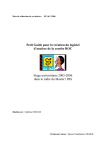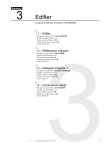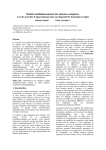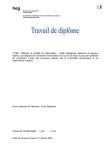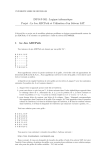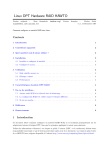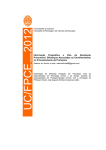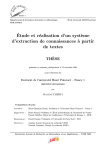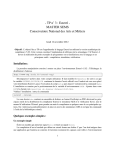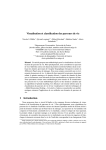Download Publications of Gilbert Ritschard
Transcript
Publications of Gilbert Ritschard Most publications can be downloaded from http://mephisto.unige.ch/gilbert/ or from the University of Geneva Open Archive http://archive-ouverte.unige.ch/ Books [Bk-1] Ritschard, G., (1980). Contribution à l’analyse qualitative des modèles économiques. Peter Lang. Edited Books [Ed-5] Guillet, F., G. Ritschard, D. A. Zighed, and H. Briand, editors, (2010). Advances in Knowledge Discovery and Management, volume 292 of Studies in Computational Intelligence. Springer, Berlin. [Ed-4] Ritschard, G. and C. Djeraba, editors, (2006). Extraction et gestion des connaissances (EGC’2006), volume RNTI-E-6 (2 volumes) of Revue des Nouvelles Technologies de l’Information. Cépaduès, (2006). [Ed-3] Ritschard, G., A. Berchtold, F. Duc, and D. A. Zighed, editors, (1998). Apprentissage: des principes naturels aux méthodes artificielles. Hermes Science Publications, Paris. [Ed-2] Brissaud, M., O. Boussaid, G. Ritschard, and J.-P. Royet, editors, (1993). Pluridisciplinarité dans les sciences cognitives, Paris : Hermes. Hermes. [Ed-1] Ritschard, G. and D. Royer, editors, (1985). Optimalité et Structure: Mélanges en hommage à Edouard Rossier . Economica, Paris. Articles, peer reviewed [Ar-29] Gabadinho, A., G. Ritschard, N. S. Müller, and M. Studer, (2011). Analyzing and visualizing state sequences in R with TraMineR. Journal of Statistical Software. (accepted with minor revisions). [Ar-28] Studer, M., G. Ritschard, A. Gabadinho, and N. Müller, (2011). Discrepancy analysis of state sequences. Sociological Methods and Research, page Forthcoming. [Ar-27] Widmer, E. and G. Ritschard, (2009). The de-standardization of the life course: Are men and women equal? Advances in Life Course Research, 14(1-2):28–39. [Ar-26] Ritschard, G., A. Gabadinho, N. S. Müller, and M. Studer, (2008). Mining event histories: A social science perspective. International Journal of Data Mining, Modelling and Management, 1(1):68–90. [Ar-25] Sauvain-Dugerdil, C., B. Gakou, F. Berthé, A. W. Dieng, G. Ritschard, and M. Lerch, (2008). The start of the sexual transition in Mali: Risks and opportunities. Studies in Family Planning, 39(4):263–280. [Ar-24] Oris, M., G. Ritschard, and G. Ryczkowska, (2006). Les solitudes urbaines. Structures et parcours dans la Genève des années 1816-1843. Annales de démographie historique, 111 - 2006/1:59–87. [Ar-23] Oris, M., G. Ritschard, and G. Ryczkowska, (2005). Siblings in a (neo-)Malthusian town. From cross-sectional to longitudinal perspectives. Historical Social Research, 30:171–194. [Ar-22] Zighed, D. A., G. Ritschard, W. Erray, and V.-M. Scuturici, (2005). Decision trees with optimal joint partitioning. International Journal of Intelligent Systems, 20(7):693–718. [Ar-21] Ritschard, G., D. A. Zighed, and N. Nicoloyannis, (2001). Maximisation de l’association par regroupement de lignes ou colonnes d’un tableau croisé. Revue Mathématiques Sciences Humaines, 39(154/155):81–97. [Ar-20] Dozio, A., C. Enz, M. Peretti, and G. Ritschard, (2000). Un modèle de prévision des impôts sur le revenu : le cas de lausanne et du canton de vaud. Revue économique et sociale, 58(2):87–102. [Ar-19] Kellerhals, J., N. Langin, G. Ritschard, and M. Sardi, (2000). Formes du sentiment Publications, Gilbert Ritschard [Ar-18] [Ar-17] [Ar-16] [Ar-15] [Ar-14] [Ar-13] [Ar-12] [Ar-11] [Ar-10] [Ar-9] [Ar-8] [Ar-7] [Ar-6] [Ar-5] [Ar-4] [Ar-3] [Ar-2] [Ar-1] 2 de responsabilité dans les mentalités contemporaines. Revue française de sociologie, 41(2):307–329. Sauvain-Dugerdil, C., N. Kalmykova, H. G. Gu, and G. Ritschard, (1997). Vivre sa vieillesse en suisse. les transformations des modes de résidence des personnes âgées. European Journal of Population, 33(13):162–212. Ritschard, G., J. Kellerhals, M. Olszak, and M. Sardi, (1996). Path analysis with partial association measures. Quality & Quantity, 30(1):37–60. Olszak, M. and G. Ritschard, (1995). The behaviour of nominal and ordinal partial association measures. The Statistician, 44(2):195–212. Ritschard, G. and A. Dozio, (1995). Calcul d’un indice des loyers par post-stratification. Revue suisse d’économie politique, 4/1(131):649–672. Antille, G. and G. Ritschard, (1992). Robust versus classical detection of atypical data. Computational Statistics & Data Analysis, 14(1):75–88. Kellerhals, J., C. Montandon, and G. Ritschard, (1992). Types of family interaction and educational styles. European Journal of Sociology, 23:308–325. Kellerhals, J., C. Montandon, G. Ritschard, and M. Sardi, (1992). Le style éducatif des parents et l’estime de soi des adolescents. Revue française de sociologie, 33(3):313–333. Ritschard, G., (1992). The fundamentals of monotone processes reviewed trough an inefficiency measure. The Quarterly Journal of Economics, 107(3):1125–1136. Ritschard, G. and G. Antille, (1992). A robust look at the use of regression diagnostics. The Statistician, 41(1):41–53. Antille, G. and G. Ritschard, (1990). Robust and classical outlyingness indicators: A simulation study. Communications in Statistics: Simulation and Computation, 19(2):505– 512. Ritschard, G., (1990). Régression robuste et problèmes de colinéarité. Statistique et Analyse des Données, 15(2):77–96. Ritschard, G. and D. A. Zighed, (1990). Réseaux neuronaux: Applications potentielles à l’économétrie. Mondes en développement, 18(72):71–79. Ritschard, G., (1983). Computable qualitative comparative static techniques. Econometrica, 51(4):1145–1168. Ritschard, G. and D. Royer, (1983). A geometric approach to disequilibrium exchange rate fluctuations: The case of switzerland. European Economic Review , 22(3):373–404. Ritschard, G., D. Royer, and M. Gilli, (1983). Pour une approche structurale en économie. Revue économique, 34(2):277–304. Ritschard, G. and D. Royer, (1982). Taux de change flottants en déséquilibre: le cas de la suisse. Prévision et Analyse économique, 3(1):93–124. Ritschard, G. and E. Rossier, (1981). Qualitative and geometric methods for large econometric models. Large Scale Systems, 2(4):269–290. Gilli, M. and G. Ritschard, (1978). Computer algorithms: A program for causal and qualitative analysis of economic models–ANAS. Econometrica, 46(2):477–478. Book Chapters, peer reviewed [Ch-49] Gabadinho, A., G. Ritschard, M. Studer, and N. S. Müller, (2011). Extracting and rendering representative sequences. In Fred, A., J. L. G. Dietz, K. Liu, and J. Filipe, editors, Knowledge Discovery, Knowledge Engineering and Knowledge Management, volume 128 of Communications in Computer and Information Science (CCIS), pages 94– 106. Springer-Verlag. [Ch-48] Gabadinho, A., G. Ritschard, M. Studer, and N. S. Müller, (2010). Indice de complexité pour le tri et la comparaison de séquences catégorielles. Revue des nouvelles technologies de l’information RNTI , E-19:61–66. [Ch-47] Müller, N. S., M. Studer, A. Gabadinho, and G. Ritschard, (2010). Analyse de séquences Publications, Gilbert Ritschard [Ch-46] [Ch-45] [Ch-44] [Ch-43] [Ch-42] [Ch-41] [Ch-40] [Ch-39] [Ch-38] [Ch-37] [Ch-36] [Ch-35] [Ch-34] 3 d’événements avec TraMineR. Revue des nouvelles technologies de l’information RNTI , E-19:639–640. Müller, N. S., M. Studer, G. Ritschard, and A. Gabadinho, (2010). Extraction de règles d’association séquentielle à l’aide de modèles semi-paramétriques à risques proportionnels. Revue des nouvelles technologies de l’information RNTI , E-19:25–36. Studer, M., N. S. Müller, G. Ritschard, and A. Gabadinho, (2010). Classer, discriminer et visualiser des séquences d’événements. Revue des nouvelles technologies de l’information RNTI , E-19:37–48. Studer, M., G. Ritschard, A. Gabadinho, and N. S. Müller, (2010). Discrepancy analysis of complex objects using dissimilarities. In Guillet, F., G. Ritschard, D. A. Zighed, and H. Briand, editors, Advances in Knowledge Discovery and Management, volume 292 of Studies in Computational Intelligence, pages 3–19. Springer, Berlin. Zighed, D. A., G. Ritschard, and S. Marcellin, (2010). Asymmetric and sample size sensitive entropy: Measures for supervised learning. In Ras, Z. W. and L.-S. Tsay, editors, Advances in Intelligent Information Systems, volume 265 of Studies in Computational Intelligence, pages 27–42. Springer, Berlin Heidelberg. Gabadinho, A., N. S. Müller, G. Ritschard, and M. Studer, (2009). TraMineR: une librairie R pour l’analyse de données séquentielles. Revue des nouvelles technologies de l’information RNTI , E-15:483. Ritschard, G., A. Gabadinho, M. Studer, and N. S. Müller, (2009). Converting between various sequence representations. In Ras, Z. and A. Dardzinska, editors, Advances in Data Management, volume 223 of Studies in Computational Intelligence, pages 155–175. Springer, Berlin. Ritschard, G., S. Marcellin, and D. A. Zighed, (2009). Arbre de décision pour données déséquilibrées: sur la complémentarité de l’intensité d’implication et de l’entropie. In Gras, R., J.-C. Régnier, and F. Guillet, editors, Analyse Statistique Implicative: une méthode d’analyse de données pour la recherche de causalités, volume E-16 of Revue des Nouvelles Technologies de l’Information (RNTI), chapter 1.7, pages 207–221. Cépaduès, Toulouse. Ritschard, G., M. Studer, and M. Oris, (2009). Analyse statistique implicative des transitions professionnelles dans la Genève du 19e siècle. In Gras, R., J.-C. Régnier, and F. Guillet, editors, Analyse Statistique Implicative: une méthode d’analyse de données pour la recherche de causalités, volume E-16 of Revue des Nouvelles Technologies de l’Information (RNTI), chapter 2.7, pages 421–435. Cépaduès, Toulouse. Sauvain-Dugerdil, C. and G. Ritschard, (2009). Un samedi à Bamako. L’émergence d’une nouvelle culture-jeunes à travers l’utilisation du temps non structuré. In Vallin, J., editor, Du genre et de l’Afrique, chapter 7, pages 113–138. INED, Paris. Studer, M., G. Ritschard, L. Baccaro, I. Georgiou, N. S. Müller, and D. A. Zighed, (2009). Relaciones entre tipos de violaciones de libertades sindicales garantizadas por los convenios de le oit: Un anáisis estadı́stico implicativo de los resultados de un an álisis automático de textos. In Orús, P., L. Zamora, and P. Gregori, editors, Teoria y applicaciones del Análisis Estadı́stico Implicativo, pages 483–504. Departamento de Matemáticas, Universitat Jaume I de Castellón. Studer, M., G. Ritschard, A. Gabadinho, and N. S. Müller, (2009). Analyse de dissimilarités par arbre d’induction. Revue des nouvelles technologies de l’information RNTI , E-15:7–18. Widmer, E., G. Ritschard, and N. S. Müller, (2009). Trajectoires professionnelles et familiales en Suisse: quelle pluralisation? In Oris, M. et al., editors, Transitions dans le parcours de vie et construction des inégalités, pages 253–272. Presses Polytechniques Universitaires Romandes, Lausanne. Marcellin, S., D. A. Zighed, and G. Ritschard, (2008). Evaluating decision trees grown with asymmetric entropies. In An, A., S. Matwin, Z. W. Ras, and D. Slezak, edi- Publications, Gilbert Ritschard [Ch-33] [Ch-32] [Ch-31] [Ch-30] [Ch-29] [Ch-28] [Ch-27] [Ch-26] [Ch-25] [Ch-24] [Ch-23] [Ch-22] [Ch-21] 4 tors, Foundations of Intelligent Systems, ISMIS08, Proceedings of the ISMIS Conference, Toronto, May 20-23, 2008 , volume LNAI 4994 of Lecture Notes in Computer Science, pages 58–67. Springer, (2008). Marcellin, S., D. A. Zighed, and G. Ritschard, (2008). Evaluation des critères asymétriques pour les arbres de décision. Revue des nouvelles technologies de l’information RNTI , E-11, I:209–210. Müller, N. S., A. Gabadinho, G. Ritschard, and M. Studer, (2008). Extracting knowledge from life courses: Clustering and visualization. In Song, I.-Y., J. Eder, and T. M. Nguyen, editors, Data Warehousing and Knowledge Discovery, 10th International Conference, DAWAK 2008, Turin, Italy, September 2-5 , volume LNCS 5182 of Lectures Notes in Computer Science, pages 176–185. Springer, Berlin Heidelberg. Müller, N. S., S. Lespinats, G. Ritschard, M. Studer, and A. Gabadinho, (2008). Visualisation et classification des parcours de vie. Revue des nouvelles technologies de l’information RNTI , E-11, II:499–510. Ritschard, G., V. Pisetta, and D. A. Zighed, (2008). Inducing and evaluating classification trees with statistical implicative criteria. In Gras, R., E. Suzuki, F. Guillet, and F. Spagnolo, editors, Statistical Implicative Analysis: Theory and Applications, volume 127 of Studies in Computational Intelligence, pages 397–420. Springer-Verlag, Berlin. Ritschard, G., M. Studer, and V. Pisetta, (2008). Strategies in identifying issues addressed in legal reports. In Brito, P., editor, COMPSTAT 2008 - Proceedings in Computational Statistics, pages 277–288. Springer, Berlin. Studer, M., A. Gabadinho, N. S. Müller, and G. Ritschard, (2008). Approches de type n-grammes pour l’analyse de parcours de vie familiaux. Revue des nouvelles technologies de l’information RNTI , E-11, II:511–522. Pisetta, V., G. Ritschard, and D. A. Zighed, (2007). Choix des conclusions et validation des règles issues d’arbres de classification. In Noirhomme, M. and G. Venturini, editors, Extraction et Gestion des Connaissances (EGC 2007), volume E-9 of Revue des nouvelles technologies de l’information RNTI , pages 485–496. Cépaduès, (2007). Ritschard, G. and C. Sauvain-Dugerdil, (2007). L’enfant ciment du couple ou le couple comme ciment de la relation du père à l’enfant? Quelques enseignements de l’enquête rétrospective du Panel Suisse de Ménages. In Burton-Jeangros, C., E. Widmer, and C. Lalive d’Epinay, editors, Interactions familiales et constructions de l’intimité., coll. Questions sociologiques, pages 57–73. L’Harmattan, Paris. Zighed, D. A., S. Marcellin, and G. Ritschard, (2007). Mesure d’entropie asymétrique et consistante. In Noirhomme, M. and G. Venturini, editors, Extraction et Gestion des Connaissances (EGC 2007), volume E-9 of Revue des nouvelles technologies de l’information RNTI , pages 81–86. Cépaduès, (2007). Losa, F. B., P. Origoni, and G. Ritschard, (2006). Experiences from a socio-economic application of induction trees. In Todorovski, L., N. Lavrač, and K. P. Jantke, editors, Discovery Science, 9th International Conference, DS 2006, Barcelona, October 7-10, 2006, Proceedings, volume LNAI 4265, pages 311–315. Springer, Berlin Heidelberg. Pisetta, V., H. Hacid, F. Bellal, G. Ritschard, and D. A. Zighed, (2006). Traitement automatique de textes juridiques. In Lehn, R., M. Harzallah, N. Aussenac-Gilles, and J. Charlet, editors, Actes de SdC 2006, Semaine de la Connaissance, 26-30 juin 2006 , Nantes, France. (CDrom et sdc2006.org). Ritschard, G., (2006). Computing and using the deviance with classification trees. In Rizzi, A. and M. Vichi, editors, COMPSTAT 2006 - Proceedings in Computational Statistics, pages 55–66. Springer, Berlin. Ritschard, G. and D. A. Zighed, (2006). Implication strength of classification rules. In Esposito, F., Z. W. Ras, D. Malerba, and G. Semeraro, editors, Foundations of Intelligent Systems, ISMIS06, Proceedings of the ISMIS Conference, Bari, September 26-29, 2006 , volume LNAI 4203, pages 463–472. Springer, Berlin. Publications, Gilbert Ritschard 5 [Ch-20] Sauvain-Dugerdil, C., G. Ritschard, and A. W. Dieng, (2006). Socio-démographie des phases tardives de la vie familiale. In Soigner, garder et payer. La famille et les phases tardives de la vie, pages 35–68. Commission fédérale de coordination pour les questions familiales, COFF, Berne. [Ch-19] Losa, F. B., P. Origoni, and G. Ritschard, (2005). Usage non classificatoire d’arbres de classification, Enseignements d’une analyse de la participation féminine à l’emploi en suisse. Revue des nouvelles technologies de l’information RNTI , E-3:7–18. [Ch-18] Ritschard, G., (2005). Arbre BIC optimal et taux d’erreur. In Cloppet, F., J.-M. Petit, and N. Vincent, editors, Extraction des connaissances: Etat et perspectives, volume E-5 of Revue des nouvelles technologies de l’information RNTI , pages 403–408. Cépaduès, (2005). [Ch-17] Ritschard, G., (2005). De l’usage de la statistique implicative dans les arbres de classification. In Gras, R., F. Spagnolo, and J. David, editors, Actes des Troisièmes Rencontres Internationale ASI Analyse Statistique Implicative, volume Secondo supplemento al N.15 of Quaderni di Ricerca in Didattica, pages 305–314. Università degli Studi di Palermo, Palermo. [Ch-16] Ritschard, G., (2005). Implication citoyenne, loisirs et études: le cas des étudiants de sciences sociales. In Widmer, E., D. Royer, B. Bürgenmeier, and F. Schultheis, editors, Théorie et pratique de la démocratie, essais en l’honneur du professeur Yves Fricker , pages 213–232. Economica, Paris. [Ch-15] Ritschard, G. and M. Oris, (2005). Life course data in demography and social sciences: Statistical and data mining approaches. In Levy, R., P. Ghisletta, J.-M. Le Goff, D. Spini, and E. Widmer, editors, Towards an Interdisciplinary Perspective on the Life Course, volume 10 of Advances in Life Course Research, pages 289–320. Elsevier, Amsterdam. [Ch-14] Oris, M. and G. Ritschard, (2004). Précarité, état absorbant ou accident de parcours ? In Fragnière, J.-P. and M. Nanchen, editors, Entre science et action. La Démographie au service de la cité. Hommage à Hermann-Michel Hagmann, pages 115–126. Réalités sociales, Lausanne. [Ch-13] Ritschard, G. and D. A. Zighed, (2004). Qualité d’ajustement d’arbres d’induction. Revue des nouvelles technologies de l’information RNTI , E-1:45–67. [Ch-12] Ritschard, G., (2003). Partition BIC optimale de l’espace des prédicteurs. Revue des nouvelles technologies de l’information RNTI , 1:99–110. [Ch-11] Ritschard, G. and D. A. Zighed, (2003). Goodness-of-fit measures for induction trees. In Zhong, N., Z. Ras, S. Tsumo, and E. Suzuki, editors, Foundations of Intelligent Systems, ISMIS03 , volume LNAI 2871, pages 57–64. Springer, Berlin. [Ch-10] Ritschard, G. and D. A. Zighed, (2003). Modélisation de tables de contingence par arbres d’induction. Revue des sciences et technologies de l’information – ECA, 17(1-3):381–392. [Ch-9] Ritschard, G. and D. A. Zighed, (2003). Simultaneous row and column partitioning: Evaluation of a heuristic. In Zhong, N., Z. Ras, S. Tsumo, and E. Suzuki, editors, Foundations of Intelligent Systems, ISMIS03 , volume LNAI 2871, pages 468–472. Springer, Berlin. [Ch-8] Zighed, D. A., G. Ritschard, W. Erray, and V.-M. Scuturici, (2003). Arbogodaı̈, a new approach for decision trees. In Lavrac, N., D. Gamberger, L. Todorovski, and H. Blockeel, editors, Knowledge Discovery in Databases, PKDD 2003 , volume LNAI 2838, pages 495– 506. Springer, Berlin. [Ch-7] Ritschard, G., (2002). Comportement d’indices obtenus par post-stratification. In Brissaud, M., editor, Ecrits sur les processus aléatoires - Mélanges en hommage à Robert Fortet, pages 265–281. Hermes-sciences, Paris. [Ch-6] Ritschard, G., (2001). Performance d’une heuristique d’agrégation optimale bidimensionnelle. Extraction des connaissances et apprentissage, 1(4):185–196. [Ch-5] Ritschard, G. and N. Nicoloyannis, (2000). Aggregation and association in cross tables. In Zighed, D. A., J. Komorowski, and J. Zytkow, editors, Principles of Data Mining and Publications, Gilbert Ritschard [Ch-4] [Ch-3] [Ch-2] [Ch-1] 6 Knowledge Discovery, volume LNAI 1910, pages 593–598. Springer-Verlag, Berlin. Ritschard, G., D. A. Zighed, and N. Nicoloyannis, (2000). Regroupement optimal dans un tableau croisé. In Actes des XXXIIèmes Journées de statistiques, pages 664–669. SFdS, Fès. Ritschard, G., (1998). De l’apprentissage naturel à l’apprentissage artificiel. In Ritschard et al. (Ed-3), pages 11–14. Kellerhals, J., C. Montandon, G. Ritschard, and M. Sardi, (1992). Cohésion familiale, styles éducatifs et estime de soi: aspects du processus de socialisation des adolescents. In de Almeida, A. N., M. D. Guerreiro, A. Torres, and K. Wall, editors, Familles et contextes sociaux , pages 233–246. Centro de Investigaçao e Estudos de Sociologia ISTE, Lisboa. Ritschard, G., (1990). Détection de données atypiques, in, (eds), paris : Editions du cnrs, 95-110. In Brissaud, M., M. Forsé, Y. Grafmayer, and D. A. Zighed, editors, La modélisation: confluent des sciences, pages 95–110. Editions du CNRS, Paris. Papers at International Conferences, peer reviewed [IC-16] Dribe, M., M. Mandredini, M. Oris, and G. Ritschard, (2010). Pathways to reproduction in pre-transitional Europe: A sequential approach. In 35th Annual Meeting of the Social Science History Association, Chicago, November 18-21 , (2010). [IC-15] Oris, M., M. Dribe, M. Mandredini, and G. Ritschard, (2010). Access to reproduction in pre-transitional Europe: A sequential approach. In Workshop on Marriage Patterns, Household Formation and Economic Development, Utrecht, October 7-9, 2010 , (2010). [IC-14] Oris, M., O. Perroux, and G. Ritschard, (2010). L’émergence des catholiques dans la rome protestante (1815-1847): les ambiguı̈tés d’une progression. In L’apprentissage du pluralisme religieux au 19e siècle: le cas genevois dans son contexte suisse et européen. Villars-sur-Glânes, Suisse, 18-19 novembre, (2010). [IC-13] Gabadinho, A., G. Ritschard, M. Studer, and N. S. Müller, (2009). Summarizing sets of categorical sequences. In International Conference on Knowledge Discovery and Information Retrieval, Madeira, 6-8 October, 2009 , pages 62–69. INSTICC. (Received the Best Paper Award). [IC-12] Müller, N. S., M. Studer, and G. Ritschard, (2007). Classification de parcours de vie à l’aide de l’optimal matching. In XIVe Rencontre de la Société francophone de classification (SFC 2007), Paris, 5 - 7 septembre 2007 , pages 157–160, (2007). [IC-11] Oris, M. and G. Ritschard, (2007). Dynamique socioprofessionnelle dans la Genève du 19e, enseignements d’une analyse de statistique implicative. In Gras, R., P. Orús, B. Pinaud, and P. Gregori, editors, Nouveaux apports théoriques à l’analyse statistique implicative et applications, ASI4, Castellón de la Plana (España), 18-21 octubre 2007 , pages 287–300. Departament de Matemàtiques, Universitat Jaume I. [IC-10] Ritschard, G., (2007). Mining event histories: A social scientist view. In IASC 2007 Conference on Statistics for data mining, learning and knowledge extraction, Aveiro, Portugal, August 30 - September 1, 2007 , (2007). on CDROM. [IC-9] Ritschard, G., D. A. Zighed, and S. Marcellin, (2007). Données déséquilibrées, entropie décentrée et indice d’implication. In Gras, R., P. Orús, B. Pinaud, and P. Gregori, editors, Nouveaux apports théoriques à l’analyse statistique implicative et applications, ASI4, Castellón de la Plana (España), 18-21 octubre 2007 , pages 315–327. Departament de Matemàtiques, Universitat Jaume I. [IC-8] Studer, M., G. Ritschard, L. Baccaro, I. Georgiou, N. S. Müller, and D. A. Zighed, (2007). Relations entre types de violation des libertés syndicales garanties par les conventions de l’OIT: une analyse de statistique implicative des résultats d’une fouille de texte. In Gras, R., P. Orús, B. Pinaud, and P. Gregori, editors, Nouveaux apports théoriques à l’analyse statistique implicative et applications, ASI4, Castellón de la Plana (España), 18-21 octubre 2007 , pages 111–122. Departament de Matemàtiques, Universitat Jaume Publications, Gilbert Ritschard [IC-7] [IC-6] [IC-5] [IC-4] [IC-3] [IC-2] [IC-1] 7 I. Marcellin, S., D. A. Zighed, and G. Ritschard, (2006). An asymmetric entropy measure for decision trees. In 11th Conference on Information Processing and Management of Uncertainty in Knowledge-Based Systems, IPMU 2006 , pages 1292–1299, Paris, France. Marcellin, S., D. A. Zighed, and G. Ritschard, (2006). Detection of breast cancer using an asymmetric entropy measure. In Rizzi, A. and M. Vichi, editors, COMPSTAT 2006 - Proceedings in Computational Statistics, pages 975–982. Springer, Berlin. (on CD). Oris, M., G. Ritschard, and G. Ryczkowska, (2006). Recrutement et renouvellement des groupes socioprofessionnels à Genève, 1816-1843. In 14e Colloque de l’Association Internationale des Démographes de Langue Française AIDELF, Aveiro, 18-22 septembre 2006 , pages 791–805, Aveiro. Université d’Aveiro et AIDELF. Sauvain-Dugerdil, C. and G. Ritschard, (2005). Temps non structuré et espaces de vie: risques ou opportunités d’une nouvelle liberté? Enquête auprès de jeunes maliens. In UIESP, XXVè Congrès International de la Population, 18-23 juillet 2005 , Tours. Ritschard, G. and G. Ryczkowska, (2004). Endogamy - community. inter-generational mobility in 19th century Geneva. In Fifth European Social Science History Conference, Berlin, March 2004 , (2004). Sauvain-Dugerdil, C., A. W. Dieng, J.-C. Deschamps, G. Ritschard, S. Konaté, and A. Tollo, (Décembre 2002). Quels outils pour explorer la nouvelle culture-jeunes ? L’application des associations verbales à l’étude de la qualité de vie et du rôle des parents chez les jeunes maliens. In Enfants d’aujourd’hui, diversité des contextes, pluralité des parcours. Colloque AIDELF 2002, Dakar , pages 56–74, Paris. Janta, M., G. Ritschard, and E. Roventa, (July 2000). From fuzzy reality to crisp categories for science, language, game playing, map making: Categorizing and classifying with rigor or laxness. In Proceedings of the Eighth International Conference IPMU , volume I, pages 556–562, Madrid. Other Conference Papers [CO-27] Oris, M., G. Ritschard, M. Dribe, M. Manfredini, S. Kurosu, and C. Campbell, (2009). Demographic behaviors and social norms: An introduction to status and sequence analysis. In Doctoral school of the Workshop on the Persistence of the Past, May 28, 2009 , Rostock. Max-Planck-Institut für demografische Forschung. [CO-26] Ritschard, G., (2009). Highlighting changes and differences in 20th century Swiss life trajectories with TraMineR. In Swiss Statistical Meeting, Geneva, October 28-30, 2009 , (2009). [CO-25] Ritschard, G., M. Oris, M. Dribe, and M. Manfredini, (2009). Sequence analysis: A new approach to life trajectories. In Colloque Sources, méthodes, innovations : nouvelles interrogations en histoire de la famille et en histoire de la population, 22èmes Entretiens Jacques Cartier, Lyon, November 30 and December 1, 2009 , (2009). [CO-24] Marcellin, S., D. A. Zighed, and G. Ritschard, (2008). Evaluation des critères asymétriques pour les arbres de décision. In Lallich, S., P. Lenca, and F. Guillet, editors, Actes du 4e atelier Qualité des données et des connaissances (QDC 2008), Nice, pages 31–38, (2008). [CO-23] Widmer, E. and G. Ritschard, (2008). Trajectoires professionnelles et familiales en Suisse : quelle pluralisation ? In Colloque lémanique IRIS Transitions dans le parcours de vie et construction des inégalités, Genève, 20-21 juin 2008 , (2008). [CO-22] Oris, M., P. Wanner, G. Ritschard, and J.-M. Bonvin, (2007). Mortalité et longévité différentielles en Suisse, 1991-2004: Prolégomènes d’une étude. In XIVème Colloque national de démographie: Démographie et santé, Bordeaux, 12 mai 2007 , (2007). [CO-21] Ritschard, G., A. Gabadinho, N. Müller, and M. Studer, (2007). Innovative data mining based approaches for life course analysis. In 4th International Conference of Panel Data Users in Switzerland (IPUC07), Neuchâtel, February 23-24, 2007 , page 17, (2007). Publications, Gilbert Ritschard 8 [CO-20] Ritschard, G., M. Studer, N. Muller, and A. Gabadinho, (2007). Comparing and classifying personal life courses: From time to event methods to sequence analysis. In 2nd Symposium of COST Action C34 (Gender and Well-Being). The Transmission of WellBeing: Marriage Strategies and Inheritance Systems in Europe from 17th-20th Centuries. University of Minho, Guimaraes, Portugal, April 25-28, 2007 , (2007). [CO-19] Ritschard, G., D. A. Zighed, L. Baccaro, I. Georgiou, V. Pisetta, and M. Studer, (2007). Mining expert comments on the application of ILO Conventions on freedom of association and collective bargaining. In Research Seminar of the International Institute of Labor Studies (ILO), January 17, 2007 , (2007). [CO-18] Studer, M., N. S. Müller, and G. Ritschard, (2007). Understanding the KDE social structure through mining of email archive. In 2nd Workshop on Public Data about Software Development (WoPDaSD 2007), Third International Conference on Open Source Systems (OSS), June 11-14, 2007, Limerick, Ireland , (2007). [CO-17] Marcellin, S., D. A. Zighed, and G. Ritschard, (2006). Une mesure d’entropie asymétrique pour les arbres de décision. In 38ème Journées de Statistique, JDS 2006 , Clamart, France. [CO-16] Oris, M. and G. Ritschard, (2006). Recrutement et renouvellement des groupes socioprofessionnels à Genève, 1816-1843. In XIV International Economic History Congress, Helsinki, 21-25 août 2006 , Helsinki. University of Helsinki. [CO-15] Zighed, D. A., S. Marcellin, and G. Ritschard, (2006). An asymmetric entropy measure for decision trees. In KNEMO, Knowledge Extraction and Modeling Workshop, 4-6 September, 2006 , Capri, Italy. [CO-14] Oris, M., G. Ritschard, and G. Ryczkowska, (Janvier 2005). Solitude et vulnérabilité dans les trajectoires de vie féminines, Genève, 1816-1843. In Colloque Itinéraires féminins, Paris. Société de Démographie Historique. [CO-13] Ritschard, G., (2005). Arbre BIC optimal et taux d’erreur. In Atelier qualité des données et connaissances DKQ05, Conférence EGC 2005 , pages 43–49, Paris. [CO-12] Ritschard, G., (November 2005). Crossroads city: Stability and turnover within the Geneva population, 1816-1843. In Social Science History Association Annual Meeting, Portland. autc. [CO-11] Oris, M., G. Ritschard, and G. Ryczkowska, (November 2004). Solitude and vulnerability in female life courses, Geneva, 1816-1843. In Social Science History Association Annual Meeting, Chicago. [CO-10] Ryczkowska, G. and G. Ritschard, (2004). Mobilités sociales et spatiales: Parcours intergénérationnels d’après les mariages genevois, 1830-1880. In Fifth European Social Science History Conference ESSHC, Berlin, March 2004 , (2004). [CO-9] Oris, M. and G. Ritschard, (October 2003). Historical demography: From a crossroad to an interdisciplinary exercise. In PAVIE Research Colloquium on Life Course, Lausanne. [CO-8] Oris, M., G. Ritschard, and A. Berchtold, (November 2003). The use of Markov process and induction trees for the study of intergenerational social mobility in nineteenth century Geneva. In Social Science History Association Annual Meeting, Baltimore. [CO-7] Ritschard, G., (2003). Testing hypotheses with induction trees. In Bulletin of the International Statistical Institute 54th Session, F Proceedings, Berlin. intc. [CO-6] Zighed, D. A., W. Erray, M. V. Scuturici, and G. Ritschard, (March 2003). Arbogodaı̈: Segmentation généralisée. In Sciences of Electronics, Technology of Information and Telecommunications, SETIT 2003 , Susa, Tunisia. [CO-5] Ritschard, G. and D. A. Zighed, (2002). Qualité d’ajustement d’arbres d’induction. Technical report, Groupe Gafo Qualité, CNRS, Paris. 16p. [CO-4] Zighed, D. A., G. Ritschard, and W. Erray, (2002). Bi dimensional partitioning with limited loss of information. In Societa Italiana di Statistica, Milan, pages 319–328, (2002). Publications, Gilbert Ritschard 9 [CO-3] Ritschard, G., D. A. Zighed, and N. Nicoloyannis, (2001). Maximiser l’association par agrégation dans un tableau croisé. In Gras, R. and M. Bailleul, editors, La fouille dans les données par la méthode d’analyse statistique implicative, pages 219–233. Ecole polytechnique de l’Université de Nantes, IRIN et IUFCM Caen. [CO-2] Berchtold, A. and G. Ritschard, (1998). Le modèle de Markov caché double. In XXXe Journées de Statistique, pages 43–45, Rennes. [CO-1] Ritschard, G., A. Dozio, and I. Ndiaye, (1998). Le choix des marges de redressement par la modélisation log-linéaire. In XXXe Journées de Statistique, pages 491–493, Rennes. Lecture Notes [LN-6] Ritschard, G., (2009). Statistique pour sciences sociales, cahier d’exercices dont certains avec solutions. Polycopié, Faculté des SES, Genève. [LN-5] Ritschard, G., (2009). Statistique pour sciences sociales, transparents du cours. Polycopié, Faculté des SES, Genève. [LN-4] Ritschard, G., A. Gabadinho, N. S. Müller, and M. Studer, (2009). Tutoriels: Données séquentielles, (I) concepts et (II) pratique dans R avec TraMineR. Brochure des dias, Conférence EGC, Strasbourg. [LN-3] Ritschard, G., (2004). Estimer un modèle de Cox en temps continu avec SPSS. In Le Goff, J.-M., editor, Modélisation des événements et transitions du parcours de vie: Mise en ouvre avec SPSS , pages 1–61. PAVIE, Lausanne. Documentation en ligne http://www2.unil.ch/pavie/documentation/introduction.htm. [LN-2] Ritschard, G. and D. A. Zighed, (Décembre 2001). Data mining et analyse des données. Tutoriel présenté sur invitation aux journées francophones de classification, SFC, Pointà-Pitre. Cahiers 1, 2 et 3. [LN-1] Ritschard, G., (1989). Introduction à la statistique. Polycopié, Faculté des SES, Genève. Miscellanea [Mi-16] Ritschard, G., (2010). CHAID and earlier supervised tree methods. Cahiers du Département d’économétrie 2010.02, University of Geneva. [Mi-15] Gabadinho, A., G. Ritschard, M. Studer, and N. S. Müller, (2009). Mining sequence data in R with the TraMineR package: A user’s guide. Technical report, Department of Econometrics and Laboratory of Demography, University of Geneva, Geneva. [Mi-14] Gabadinho, A., N. S. Müller, M. Studer, and G. Ritschard, (2008). TraMineR. Reference manual, CRAN. [Mi-13] Müller, N. S., S. Lespinats, G. Ritschard, M. Studer, and A. Gabadinho, (2008). Extracting knowledge from life courses: Visualization and classification. Unpublished Manuscript. [Mi-12] Ritschard, G., (2008). R-Sweave, WinEdt support for R and Sweave. WinEdt macro, Department of Econometrics of the University of Geneva. [Mi-11] Müller, N. S., M. Studer, and G. Ritschard, (2007). Classification des parcours de vie familiale à l’aide d’un algorithme d’optimal matching. Manuscrit, Université de Genève. (soumis). [Mi-10] Ritschard, G., L. Baccaro, J.-M. Bonvin, and D. A. Zighed, (2007). Social dialogue regimes: An investigation in the structural determinants and socioeconomic outcomes of negotiated regulation. Final report, University of Geneva and ILO International Institute of Labor Studies, Geneva. [Mi-9] Ritschard, G., A. Gabadinho, N. S. Müller, and M. Studer, (2007). Mining event histories. Manuscript, Université de Genève. (under review). [Mi-8] Ritschard, G., D. A. Zighed, L. Baccaro, I. Georgiou, V. Pisetta, and M. Studer, (July 2007). Mining expert comments on the application of ILO Conventions on freedom of association and collective bargaining. Working Papers 2007.02, Department of Econometrics of the University of Geneva. Publications, Gilbert Ritschard 10 [Mi-7] Ritschard, G., (2006). PDFnup a macro for organizing multiple pdf pages in r x c form by page. WinEdt macro, Department of Econometrics of the University of Geneva. [Mi-6] Corbet, G., G. Ritschard, D. A. Zighed, M. Charpe, and H. Hacid, (2005). Etudes de l’interdépendance des marchés immobiliers résidentiels sur le bassin franco-valdogenevois, Rapport final. Projet Interreg IIIA France-Suisse 29/BL/1.1/5, Université de Genève et Université de Lyon 2, Genève et Lyon. [Mi-5] Ritschard, G., (2005). Guide d’utilisation de la classe LaTeX rnti version 2 pour articles de la Revue des nouvelles technologies de l’information (Cépaduès). Manuel d’utilisateur, RNTI (www.antsearch.univ-tours.fr/rnti). [Mi-4] Ritschard, G. and M. Oris, (2004). Dealing with life course data in demography: Statistical and data mining approaches. Manuscript, University of Geneva. [Mi-3] Antille Gaillard, G., G. Ritschard, and Y. Schorderet, (2003). Analyse du marché des locaux commerciaux. Document de travail, LEA, Université de Genève, Genève. [Mi-2] Baccaro, L., J.-M. Bonvin, J.-P. Laviec, P. O’Donovan, G. Ritschard, and D. A. Zighed, (2003). Social dialogue regimes: An investigation in the structural determinants and socioeconomic outcomes of negotiated regulation. Research proposal supported financially by the Geneva International Academic Network (GIAN), IILS and University of Geneva. [Mi-1] Ritschard, G., D. A. Zighed, and N. Nicoloyannis, (2000). Optimal grouping in cross tables. Technical report, Department of Econometrics, University of Geneva.











